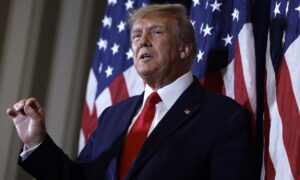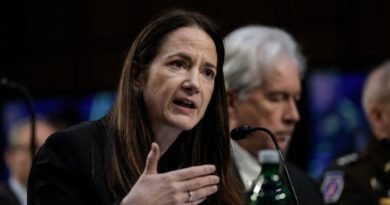Grand Jury Votes to Indict Former President Donald Trump

Former President Donald Trump on Thursday became the first former U.S. president in history to be indicted.
Trump’s attorney, Joseph Tacopina, confirmed the indictment by the office of Manhattan DA Alvin Bragg to The Epoch Times on March 30.
Bragg’s office has been investigating Trump for his alleged involvement in a $130,000 payment to adult entertainment actress Stormy Daniels by Trump’s then-lawyer Michael Cohen in the leadup to the 2016 presidential election. The payment allegedly was to stop Daniels from going public with an affair she claims to have had with Trump, who denies the claim.
The indictment came after weekslong proceedings where a grand jury heard testimony from former Trump associates, including Cohen and Cohen’s former attorney Robert Costello.
While the indictment remains sealed, it is believed the case heavily relies on Cohen’s testimony. Cohen pleaded guilty to violating federal campaign finance laws in 2018 by arranging payments to Daniels and another woman claiming to have had an affair with Trump. In his plea agreement, the attorney claimed to have done so at Trump’s direction and that he was reimbursed by the Trump Organization through routine legal expenses, despite his earlier claims that he paid the money out of his own pocket.
Trump, a candidate in the 2024 presidential election, has denied any wrongdoing, claiming that he’s a victim of extortion.
Legal Hurdles
Bragg’s case against Trump, which some have said employs a “novel” legal argument, faces significant legal hurdles, according to some legal experts.
Alan Dershowitz, a legal scholar who taught at Harvard Law for fifty years, was highly skeptical of Bragg’s bid to combine state and federal laws—the false records charge and the campaign finance laws, respectively.
“There’s a federal campaign statute, and there’s a state record statute, and the two have nothing to do with each other,” Dershowitz told The Epoch Times on March 18. “But in order to turn the state statute into a felony, you have to borrow a federal statute, which seems to raise real, serious legal questions.”
There’s also the question of if the statute of limitation has run out on this case.
Under New York state law, falsifying business records by itself is a misdemeanor, which carries a statute of limitation of two years. But if the records fraud was used to cover up or commit another crime, the charge would be elevated to a felony, which carries a statute of limitations of five years.
Since the payment to Daniels took place in October 2016, a case pursuing felony charges would still be two years past the statute of limitations under normal circumstances. But Bragg is expected to make use of a provision in the state law that stops the statutes of limitations clock when “the defendant was continuously outside” of New York, trial attorney John O’Connor told The Epoch Times in an interview. The district attorney is expected to argue that the clock was paused because Trump was based in Washington and Florida during the period from 2016, O’Connor said.
During this period, however, Trump still spent some time in New York. The issue thus hinges on the interpretation of the word “continuously,” with legal experts divided on which way the court might go on this point.
What Happens Next
Following normal procedures, prosecutors would negotiate Trump’s voluntary surrender at the district attorney’s office in lower Manhattan. Trump’s lawyer, Joseph Tacopina, has previously said the former president would voluntarily surrender if he was indicted. In this case, Trump would appear at the district attorney’s office at an agreed-upon time for booking, which includes getting fingerprinted, having his mugshot taken, and being read his Miranda rights.
He would later be arraigned, which typically occurs within a few hours, at a courtroom in the same building. During this court proceeding, Trump’s defense team will be handed the physical copy of the indictment, and Trump would plead not guilty. Trump would then be released on his own recognizance, as New York law bars prosecutors from seeking bail for non-violent felony charges.
In the unlikely event that Trump doesn’t voluntarily surrender, the extradition process would begin, which would require sign off by Florida Gov. Ron DeSantis, also Trump’s major rival for the Republican nomination for the 2024 presidential race.
As to whether DeSantis has the power to intervene in a prospective extradition request, Florida defense attorney Andrew Moses told The Epoch Times that the governor’s role is largely “ministerial” when receiving an extradition request from another state. Florida law stipulates that the governor may investigate the demand of another state to extradite, Moses said, meaning that DeSantis could potentially delay the extradition if he chooses so, but cannot deny it altogether.
Dershowitz told The Epoch Times that he believes Trump would be convicted of a crime after a jury trial in Manhatten but would later win on appeal.
“Because I don’t think that Trump can get a fair trial in New York,” the legal expert said, pointing to the city’s predominantly Democrat-voting population.
“Then it will be reversed on appeal, but by that time, we’ll be deep into the election cycle,” Dershowitz said, referring to the 2024 presidential election.
A Trump spokesperson has described the case as another instance of “the weaponization of our injustice system.”
“The George Soros-funded Radical Left Democrat prosecutor in Manhattan has decided to take his Witch-Hunt to the next level,” the spokesperson wrote in a statement to The Epoch Times last week.
Meanwhile, Trump has maintained that he will stay in the presidential race if criminal charges are made against him.
“Oh, absolutely, I won’t even think about leaving,” Trump told reporters at the Conservative Political Action Conference on March 4 in response to a question on the matter. “Probably, it’ll enhance my numbers, but it’s a very bad thing for America. It’s very bad for the country.”
The indictment marks the first criminal charge against Trump to materialize, as the former president still faces potential prosecution in three other investigations: A Georgia probe into alleged interference in the 2020 presidential election, a Department of Justice (DOJ) probe into Trump’s handling of classified documents at his Mar-a-Lago property, and another a DOJ investigation into Trump’s alleged efforts to overturn the 2020 election results.




